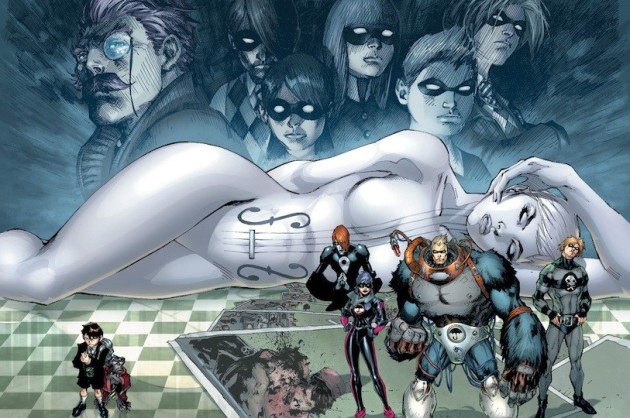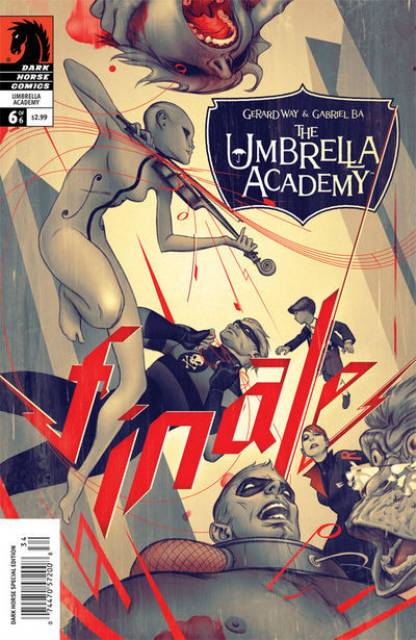Is The Umbrella Academy the cooler hipper version of Guardians of the Galaxy that we all deserved?
Genre: Superhero
Premise: An oddball superhero family of brothers and sisters who broke up over a decade ago, must come together when their sister becomes involved in a dark musical plan to destroy the world.
About: The under-appreciated Dark Horse Comics is trying to get another major superhero movie made. Dark Horse is no stranger to film adaptations. They’re responsible for 300, Hellboy, and that Jean Claude Van Damme classic, Time Cop. But “The Umbrella Academy” would be a different beast entirely, a 200 million dollar summer popcorn extravaganza. Which is probably why it hasn’t been made yet. The oddball comic, created by My Chemical Romance frontman, Gerard Way, was purchased by Universal, who has been sitting on it for almost a decade, afraid to pull the trigger. This draft was written by Mark Bomback, who wrote the last two Planet of the Apes films everyone loved so much. Edit: Been informed that Netflix is adapting this now. Definitely better for television format, for all the reasons I bring up in the review.
Writer: Mark Bomback (based on the comic by Gerard Way)
Details: 116 pages
A superhero project that no one’s ever heard of?
And Universal, desperately in need of a superhero franchise, has the rights but isn’t actively developing it?
What, pray-tell, is going on here?
I don’t know why Universal is so anti-superhero. They have the rights to a surefire hit movie on their hands (The Hulk) yet refuse to make it. It’s possible they’ve been smelling themselves since that monster 2015. But now that their big monster franchise, Dark Universe, is D.O.A., they may go back to evaluating their library.
But is there room for any more superhero movies? I would say “No” but every time someone has declared the end of the superhero era, they’ve been wrong. Which means that if you can come up with something fresh and cool, something we haven’t quite seen before, you could strike gold. Is The Umbrella Academy that film?
Sir Reginald Hargreeves (a.k.a. “The Monocle,” a.k.a. an alien) is thrust into action when it’s been revealed that all around the world, 43 babies have been mysteriously birthed despite their mothers never having been pregnant. The Monocle knows that these kids are special, somehow, so he tries to snatch up as many of them as possible.
He’s able to adopt seven of them, which include, Spaceboy, the strongest of the group, Kraken, who can hold his breath for three weeks, Rumor, who can make anything happen simply by saying she heard a rumor about it, Seance, a psychic, The Boy, who can travel into the future, The Horror, who sports tentacles, and Vanya. Vanya is the only member of the family without powers. She’s just really good at playing violin.
The Umbrella Academy, as they are known, become insta-famous before insta-famousness was a thing. They’re like a superhero version of The Beatles. The problem is, they all hate each other and they’re constantly getting into fights. So the public gets sick of them and they all eventually break up and go their separate ways.
Ten years later, Vanya gets an audition to be in an orchestra. But the conductor proves to be a creepy little bugger, revealing that he’s created a piece of music that, when played in its entirety, will destroy the world. Vanya is the only musician good enough to play the violin for the piece, and before she can say no, he puts her in a trance, forcing her to play.
Meanwhile, the academy’s father dies, bringing the family back together. When The Boy shows up – still ten years old by the way – he reveals that he’s just spent the last 60 years in the future, farting around. Oh, one more thing, he says. The future is an apocalyptic wasteland. And according to his calculations, the point of destruction happens in TWELVE HOURS.
The superhero family who hates each other now must figure out who’s destroying the world and stop them. When they realize it’s their own sister, they’ll have to make one hell of a tough choice. Kill their own fam or let the world burn.
Oh, and there’s a monkey that talks too. His name is Pogo.
When you have a ton of exposition and world-building in your story, as is the case with The Umbrella Company, you’re going to have to make some cuts somewhere. You’re going to have to sacrifice scenes or characters or backstory SOMEWHERE. Because if you try and include it all, your script is going to drown under the weight of its own ambition.
This is why I promote simplicity so much. Week after week, month after month, year after year, it’s the only piece of screenwriting advice that holds true for every story and every situation. Get down to the bare-bones of your story, figure out what it’s going to be about, and avoid adding shit that doesn’t matter.
The first 20 pages of The Umbrella Academy is one giant montage of exposition setting up this incredibly complex family. I mean you have non-pregnant women having babies. Talking monkeys. You have kids named 00.01, 00.02, 00.03, who then each get new names, who then each get powers, who we then watch grow up, love each other, hate each other, become stars, break up.
Once that sequence is over, we meet all of these characters AGAIN, but this time as adults. So it’s essentially a second set of full introductions. All of that takes up the first 40 pages.
Now here’s the thing. We will care more about these characters if we meet them when they’re young. There’s no question about that. The longer you know a character, the more you know about them, the more you care about them. But this is what I’m talking about. We’re not operating in a screenwriting utopia where the audience will gladly sit around for four hours while we tell our story.
The audience is the exact opposite. They’re easily bored, easily distracted, and don’t have time to waste. So that means EVEN THOUGH it would be better for character development if we met The Umbrella Academy when they were kids, we need to make sacrifices somewhere. And the first sacrifice probably needs to be made with that opening sequence. Start us when these characters are adults and imply their past.
And I say that factoring in multiple variables, such as the fact that we’re covering SEVEN DIFFERENT CHARACTERS here. If this were about ONE superhero, and therefore we’d be able to set his past up in 1/7th the amount of time, I would be okay with starting this movie in the past. But that’s not the case. We have a ton of characters to cover.
Unfortunately, The Umbrella Academy is battling this issue throughout its screenplay. It’s always one part fun, two parts exposition. And writers have to remember that reading needs to be fun. If it’s work, the script isn’t working. And I know when a script is work because I’m taking notes the whole time. That’s what was happening here. Note after note after note.
And it’s too bad, because I think there’s something to this. It’s sort of like X-Men meets Guardians of the Galaxy, but with its own unique voice, with its own unique aesthetic. I love that this is, at its heart, a story about family. I love that there’s an organic wedge that’s been driven between this family, creating conflict that can be milked in basically every dialogue scene between the family members.
And it’s a different kind of conflict than appears in Guardians. In Guardians, the key players didn’t know each other before they teamed up. So the conflict was more surface-level. Here, the conflict is dripping with history. There’s so much subtext to the conversations because of how deep these rifts go.
And props for writers who finally came up with an original villain with an original plan. In all of these superhero movies and scripts I’ve read, I haven’t come across one with a world-ending concerto.
I didn’t love The Umbrella Company, but I think there’s something here that they should keep developing. It reminds me a bit of Internet Explorer. That used to be the best web browser. But then they kept adding shit and adding shit and adding shit until it became bloated beyond function. That allowed for streamlined browsers to come in and steal their market share. That’s what The Umbrella Company needs to do. It needs to streamline.
[ ] What the hell did I just read?
[ ] wasn’t for me
[x] worth the read
[ ] impressive
[ ] genius
What I learned: If you have to include exposition on virtually every page of your script, you’re trying to include too much. This can happen to writers who are trying to be loyal to the source material or writers who want to be truthful to the event they’re depicting (a World War 2 battle they’ve researched extensively, for example). But keep in mind that the audience member just wants a good story. They don’t want to have to take notes for two hours to understand what’s going on.



